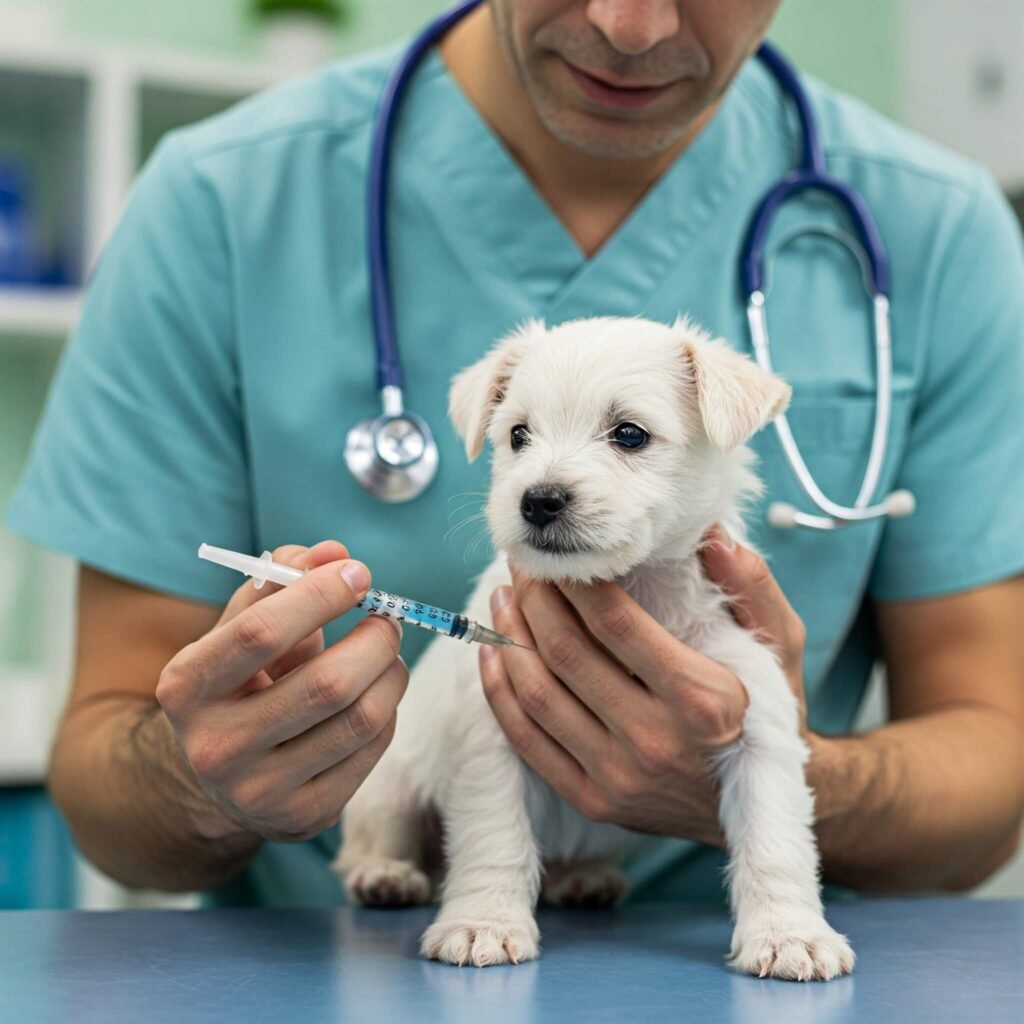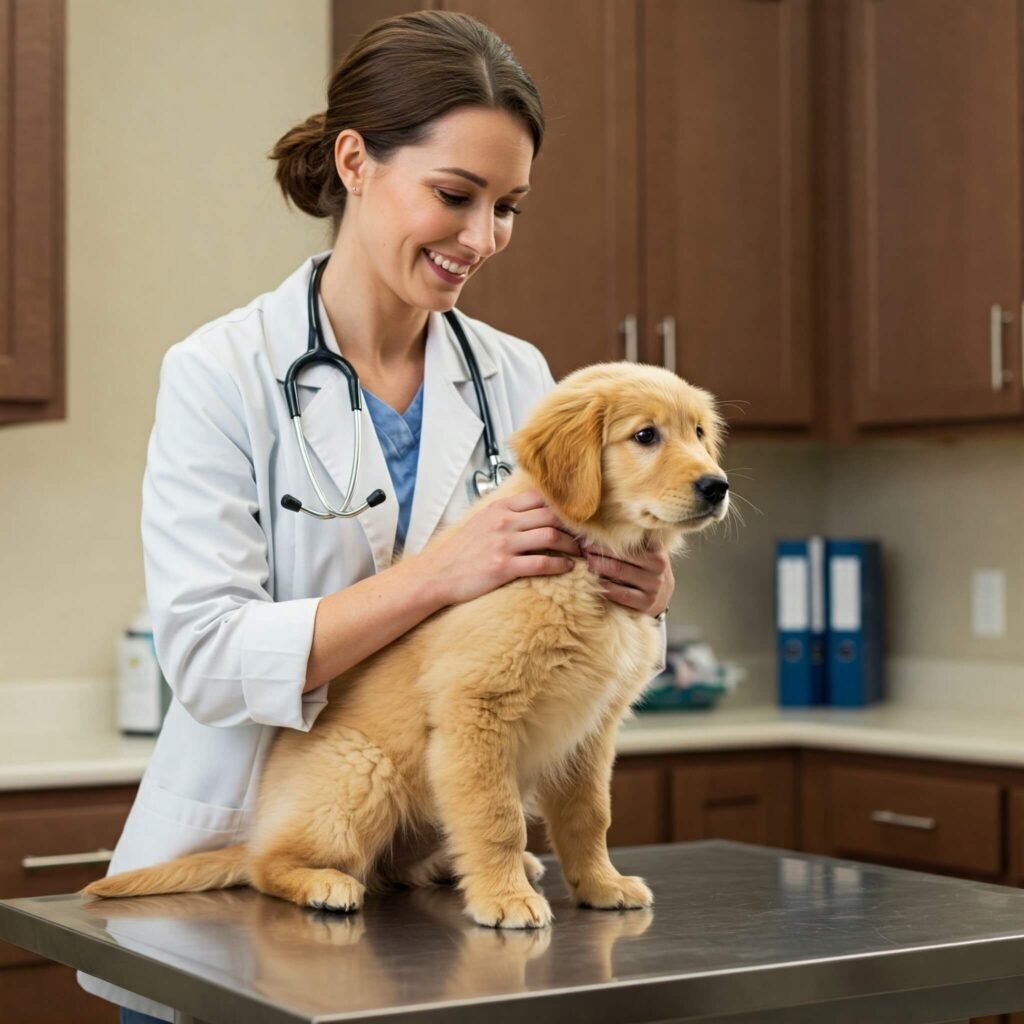Starting a new life with a puppy is a joyous journey, but it also brings responsibilities. To ensure your new furry friend’s well-being, understanding and adhering to the vaccination schedule for puppies is crucial. This guide breaks down the essential vaccinations your puppy needs month-by-month, helping you protect them from preventable diseases and setting them up for a healthy life.
H2: The Importance of the Puppy’s Vaccination Schedule for Optimal Health
Firstly, let’s explore why the vaccination schedule for puppies is so important. Essentially, this vaccination program provides optimal protection during their vulnerable early months. While puppies receive some initial immunity from their mother’s milk, this protection wanes over time. Consequently, vaccinations stimulate their immune system to produce antibodies against specific diseases, which is the core principle of the puppy’s vaccination schedule.
- Why Follow a Vaccination Schedule for Your Puppy?
- Primarily, it protects against potentially fatal diseases like parvovirus and distemper, key elements in the puppy’s vaccination schedule.
- Furthermore, it helps build a strong immune system, a crucial goal of the puppy vaccination program.
- Ultimately, it contributes to overall community health by preventing outbreaks, a benefit of following the vaccination schedule for puppies.
- Core vs. Non-Core Vaccines within the Puppy’s Vaccination Timeline:
- Generally, veterinarians recommend core vaccines for all puppies as part of their standard vaccination schedule.
- Conversely, veterinarians tailor non-core vaccines to a puppy’s lifestyle and risk factors within the puppy’s vaccination timeline.
H3: Core Vaccinations: Essential for Every Puppy’s Vaccination Plan
Specifically, the core vaccines are essential for all puppies, regardless of their breed or lifestyle, and are a key part of the vaccination schedule for puppies.
- DHPP (Distemper, Hepatitis, Parvovirus, Parainfluenza): Notably, this protects against several serious viral diseases and is vital in the puppy’s vaccination plan.
- Rabies: Additionally, the law requires this in most areas, and it protects against a deadly neurological disease, making it a critical part of the vaccination schedule for puppies.
H2: Month-by-Month Guide to Your Puppy’s Vaccination Schedule Compliance
Now, let’s examine the structured vaccination schedule for puppies, which is vital for their well-being.
- 6-8 Weeks: Initiating Your Puppy’s Vaccination Schedule
- Administer the first DHPP vaccine, initiating the puppy’s vaccination schedule.

- 10-12 Weeks: Continuing Your Puppy’s Vaccination Schedule
- Administer the second DHPP vaccine, continuing the puppy’s vaccination schedule.
- 14-16 Weeks: Completing the Initial Puppy’s Vaccination Schedule
- Administer the final DHPP vaccine and the Rabies vaccine, completing the initial puppy’s vaccination schedule.
- 16+ Weeks: Maintaining Protection with Your Puppy’s Vaccination Program
- Administer booster shots as your veterinarian recommends, ensuring long-term protection via the puppy’s vaccination program.

H3: Tailoring Non-Core Vaccines to Your Puppy’s Lifestyle and Vaccination Needs
Moreover, your veterinarian may recommend non-core vaccines, depending on your puppy’s lifestyle, to enhance their puppy vaccination needs.
- Leptospirosis: Particularly, for puppies exposed to standing water, as part of their tailored puppy vaccination needs.
- Bordetella (Kennel Cough): Especially, for puppies who will be boarded or socialized in group settings, to protect them via their puppy vaccination needs.
- Lyme Disease: Also, for puppies in areas with a high tick population, adding to their puppy vaccination needs.
H2: Ensuring a Smooth Vaccination Experience for Your Puppy’s Overall Health
Next, make the vaccination experience as stress-free as possible for your puppy’s overall health.
- Find a Trusted Veterinarian:
- Establish a good relationship with a vet who understands your puppy’s needs regarding their puppy’s overall health.
- Keep Records:
- Maintain a vaccination record for your puppy, tracking their puppy’s overall health.
- Monitor for Side Effects:
- Watch for any adverse reactions after vaccinations, to ensure their puppy’s overall health.
- Socialization:
- Then, start socializing your puppy after the vet clears it, once the required vaccination schedule for puppies is met, for their overall puppy’s overall health.
H2: The Lifelong Importance of Booster Shots in Your Puppy’s Vaccination Program
Finally, boosters maintain immunity, which is crucial in the puppy’s vaccination program.
- Annual Boosters:
- Generally, most core vaccines require annual boosters, for the long-term effectiveness of the puppy’s vaccination program.
- Titer Testing:
- Alternatively, some vets may recommend titer testing to check antibody levels, helping to customize the puppy’s vaccination program.

Conclusion:
In summary, following the vaccination schedule for puppies is crucial for their health and well-being. By staying informed and working closely with your veterinarian, you can ensure your puppy has a strong foundation for a long and happy life, through their comprehensive puppy’s vaccination program.
Outbound Links:








































